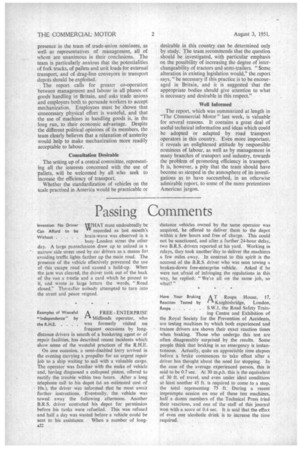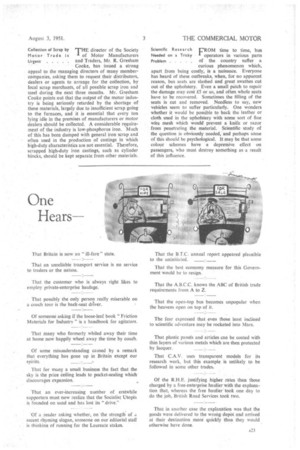Passing Comments
Page 24

Page 25

If you've noticed an error in this article please click here to report it so we can fix it.
Invention No Driver WHAT must undoubtedly be Can Afford to be " recorded as last month's Without brain-wave was observed in a busy London street the other day. A large pantechnicon drew up to unload in a narrow side street used by car drivers as a means for avoiding traffic lights farther up the main road. The presence of the vehicle effectively prevented the use of this escape road and caused a hold-up. When the jam was cleared, the driver took out of the back of the van a trestle and a card which he pinned to it, and wrote in large letters the words, " Road closed." Thee after nobody attempted to turn into the street and peace reigned.
Examples of Wasteful FREE ENTERPRISE "Independence" by A Midlands operator, who
the R.H.E was formerly visited on frequent occasions by longdistance drivers in search of a bunkering agent or of repair facilities, has described recent incidents which show some of the wasteful practices of the R.H.E.
On one occasion, a semi-disabled lorry arrived in the evening carrying a propeller for an urgent repair job to a ship waiting to sail with a valuable cargo. The operator was familiar with the make of vehicle and, having diagnosed a collapsed piston, offered to rectify the trouble within two hours. After a long telephone call to his depot (at an estimated cost of 10s.), the driver was informed that he must await further instructions. Eventually, the vehicle was towed away the following afternoon. Another B.R.S. driver contacted his depot for permission before his tanks were refuelled. This was refused and half a day was wasted before a vehicle could be sent to his assistance. When a _number of tons-' A22 distance vehicles owned by the same operator was acquired, he offered to deliver them to the depot within a few hours and free of charge. This could not be sanctioned, and after a further 24-hour delay, two B.R.S. drivers reported at. his yard. Working in relays, they took another "day to deliver the machines a few miles away. In contrast to this spirit is the account of the B.R.S. driver who was seen towing a broken-down free-enterprise vehicle. Asked if he were not afraid of infringing the regulations in this way, he replied: " We'ie all on the same job, so what? "
Have Your Braking A T Rospa House, 17, Reaction Tested by Knightsbridge, London, Rospa ...... S.W.1, the Road Safety Train
ing Centre and Exhibition of the Royal Society for the Prevention of Accidents, are testing machines by which both experienced and N trainee drivers are shown their exact reaction times when braking. Those who undergo this test are often disagreeably surprised by the results. Some people think that braking in an emergency is instantaneous. Actually, quite an appreciable time elapses before a brake commences to take effect after a driver has thought about the need for stopping. In the case of the average experienced person, this is said to be 0.7 sec. At 30 m.p.h. this is the equivalent of 30 ft. of travel, and even under ideal conditions at least another 45 ft. is required to come to a stop, the total representing 75 ft. During a recent impromptu session on one of these test machines, half a dozen members of the Technical Press tried their reactions, and one of the staff of this journal won with a score of 0_4 sec. It is said that the effect of even one alcoholic drink is to increase the time required. Collection of Scrap by Motor Trade is Urgent'
THE director of the Society of Motor Manufacturers and Traders, Mr. R Gresham
• Cooke, has issued a strong appeal to the managing directors of many membercOrnpanies, asking them to request their distributors, dealers or agents to arrange for the collection, by focal scrap merchants, of all possible scrap iron and steel during the next three months. Mr. Gresham Cooke points out that the output of the motor industry is being seriously retarded by the shortage of these materials, largely due to insufficient scrap going to the furnaces, and it is essential that every ton lying idle in the premises of manufacturers or motor dealers should be collected. A considerable requirement of the industry is low-phosphorus iron. 'Much of this has been dumped with general iron scrap and often used in the production of castings in which high-duty characteristics are not essential. Therefore, scrapped high-duty iron castings, such as cylinder blocks, should be kept separate from other materials.
Scientific Research pRom time to time, bus Needed on a Tricky I operators in various parts
Problem of the country suffer a
'curious phenomenon which, apart from being costly, is a nuisance. Everyone has heard of these outbreaks., when, for no apparent reason, bus seats are slashed and great swathes cut out of the upholstery.. Even a small patch to repair the damage may cost £5 or so, and often, whole seats have to be recovered. Sometimes the filling of the seats is cut and removed. Needless to say, new vehicles seem to suffer particularly. One wonders whether it would be possible to back the leather or cloth used in the upholstery with some sort of fine wire mesh which would prevent a knife or razor from penetrating the. material. Scientific study of the question is obviously needed, and perhaps some of this should be psychological. It may be that some coIotir schemes have a depressive effect on passengers, who must destroy something as a result of this influence.




















































































